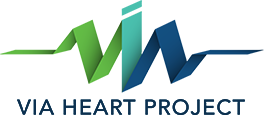Q: What happens during a heart screening?
During the screening we will record the participant’s height, weight, and blood pressure. A healthcare professional will then review the health history questionnaire. An EKG will be performed on the participant and reviewed by a cardiologist. After EKG review, if the cardiologist deems it necessary, the participant will be sent for an echocardiogram. (Essentially a painless ultrasound of the heart.)
Q: What is an electrocardiogram? (Also called an EKG or ECG.)
The EKG is a noninvasive, painless test that delivers quick results. During an EKG, sensors (electrodes) that detect the electrical activity of the heart are placed on a person’s chest and limbs. The sensors remain in place for just a few minutes while the heart’s electrical activity is recorded.
Q: What is an echocardiogram? (Also called an echo.)
An echocardiogram is an ultrasound that allows us to view the structure of the heart. An echo is noninvasive and takes approximately 10 minutes.
Q: How long is each participant’s screening?
Plan for the screening to take approximately 2 hours.
Q: What should a participant bring to the screening?
Everyone must bring their fully completed health history questionnaire and signed waiver. Participants under the age of 18 must have the permission form signed by a parent or guardian.
Q: Do parents have to attend the screening?
Parents are encouraged to join us at the screening if they are able, however it is not required. Please ensure the screening packet and health history questionnaire is completely filled out and signed. To participate in the screening event, all youth under 18 must have their parent or guardian’s signature on their permission form.
Q: What should a participant wear to the screening?
Participants should wear a T-shirt, sweatpants, or sport shorts. Girls should wear a sports bra. Girls will be asked to remove the T-shirt but will keep the sports bra on at all times. Girls will be screened by female health professionals in an area separate from the boys. Paper gowns are available, upon request.
Q: I need to change our registration time. Is that possible?
Unfortunately, our system does not allow participants to adjust their registration time. However, you may re-register for the ideal time and then simply email screening@viaheartproject.org to let us know which time to delete.
Q: I want to register, but the screening time we want is full. What’s next?
If your first choice is unavailable, please select a second-choice time slot that is open. We apologize for the inconvenience.
Q: Should I do anything with the results of this test?
We strongly urge you to share the results with the participants’s pediatrician (or family doctor) so the information is documented in their medical records. We do not share the results with anyone including the school.
Q: If the cardiac screening is within normal limits, does this mean that the heart is healthy?
An EKG can only detect 60% of those at risk for sudden cardiac death at the time of the screening. This EKG is meant to be a baseline to compare with future EKG evaluations. Current international recommendations are to repeat the EKG every two years through age 25, or if any warning signs or symptoms of a heart condition are present.
Q: What are the warning signs or symptoms of a heart condition?
• Fainting
• Chest pain or pressure
• Skipped heartbeat
• Fast heart beat
• Light headedness
• Seizure
• Unexplained Fatigue
Q: What if I need additional privacy?
We want to assure you that participants’ confidentiality, privacy and individual modesty will be respected throughout all aspects of the screening. If more privacy is needed, please notify a Via Heart Project medical volunteer or staff person for referral to the private screening area.
Q: If the cardiac screening EKG findings indicates the need for follow up evaluation and testing with a physician, does that mean there is a life threatening condition?
Possibly, but 2% of EKG screenings will result in “false positive” findings. A false positive EKG indicates a defect may exist, but further testing shows there is no problem. We believe the benefit of this potentially life-saving screening outweighs this concern.
Q: How do I request a copy of my echocardiogram?
Echocardiogram outcomes are recorded on the results sheet, but the echo report and images are not retained and therefore cannot be requested.
Q: How do I request a copy of my EKG?
Participants/Parents/Guardians can request a pdf of their EKG to be sent electronically, via email to the email address provided during online registration. This pdf will not be sent through a secure system. Participants may request a copy of their EKG results, by emailing screening@viaheartproject.org . Requests must be made within 30 days of the screening.
